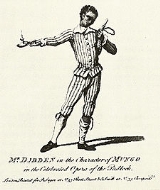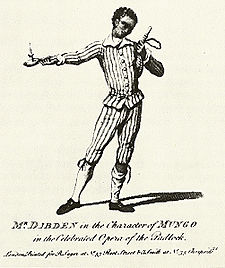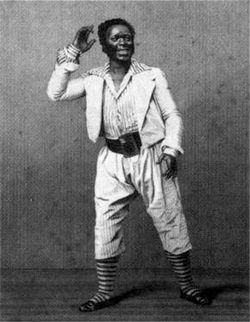
The Padlock
Encyclopedia

Afterpiece
An afterpiece is a short, usually humorous one-act playlet or musical work following the main attraction, the full-length play, and concluding the theatrical evening. This short comedy, farce, opera or pantomime was a popular theatrical form in the 18th and 19th centuries...
' opera
Opera
Opera is an art form in which singers and musicians perform a dramatic work combining text and musical score, usually in a theatrical setting. Opera incorporates many of the elements of spoken theatre, such as acting, scenery, and costumes and sometimes includes dance...
by Charles Dibdin
Charles Dibdin
Charles Dibdin was a British musician, dramatist, novelist, actor and songwriter. The son of a parish clerk, he was born in Southampton on or before 4 March 1745, and was the youngest of a family of 18....
. The text was by Isaac Bickerstaffe
Isaac Bickerstaffe
Isaac Bickerstaffe or Bickerstaff was an Irish playwright and Librettist.-Early life:Isaac John Bickerstaff was born in Dublin, on 26 September 1733, where his father John Bickerstaff held a government position overseeing the construction and management of sports fields including bowls and tennis...
. It debuted in 1768 at the Drury Lane Theatre
Theatre Royal, Drury Lane
The Theatre Royal, Drury Lane is a West End theatre in Covent Garden, in the City of Westminster, a borough of London. The building faces Catherine Street and backs onto Drury Lane. The building standing today is the most recent in a line of four theatres at the same location dating back to 1663,...
in London
London
London is the capital city of :England and the :United Kingdom, the largest metropolitan area in the United Kingdom, and the largest urban zone in the European Union by most measures. Located on the River Thames, London has been a major settlement for two millennia, its history going back to its...
, England
England
England is a country that is part of the United Kingdom. It shares land borders with Scotland to the north and Wales to the west; the Irish Sea is to the north west, the Celtic Sea to the south west, with the North Sea to the east and the English Channel to the south separating it from continental...
, as a companion piece to The Earl of Warwick. It partnered other plays before a run of six performances in tandem with "The Fatal Discovery" by John Home. "The Padlock" was a success, largely due to Dibdin's portrayal of Mungo, a blackface
Blackface
Blackface is a form of theatrical makeup used in minstrel shows, and later vaudeville, in which performers create a stereotyped caricature of a black person. The practice gained popularity during the 19th century and contributed to the proliferation of stereotypes such as the "happy-go-lucky darky...
caricature
Caricature
A caricature is a portrait that exaggerates or distorts the essence of a person or thing to create an easily identifiable visual likeness. In literature, a caricature is a description of a person using exaggeration of some characteristics and oversimplification of others.Caricatures can be...
of a black
Black people
The term black people is used in systems of racial classification for humans of a dark skinned phenotype, relative to other racial groups.Different societies apply different criteria regarding who is classified as "black", and often social variables such as class, socio-economic status also plays a...
servant from the West Indies. The company took the production to the United States
United States
The United States of America is a federal constitutional republic comprising fifty states and a federal district...
the next year, where a portrayal by Lewis Hallam, Jr. as Mungo met with even greater accolades. The libretto
Libretto
A libretto is the text used in an extended musical work such as an opera, operetta, masque, oratorio, cantata, or musical. The term "libretto" is also sometimes used to refer to the text of major liturgical works, such as mass, requiem, and sacred cantata, or even the story line of a...
was first published in London in 1768 (?) and in Dublin in 1775. The play remained in regular circulation in the U.S. as late as 1843. It was revived by the Old Vic Company in London and on tour in the UK in 1979 in a new orchestration by Don Fraser and played in a double-bill with Garrick's Miss In Her Teens. The role of Mungo was,again, played by a white actor. Opera Theatre of Chicago have recently revived the piece (2007?) where, it would seem, the role of Mungo was changed to that of an Irish servant.
Story and music
Bickerstaffe's librettoLibretto
A libretto is the text used in an extended musical work such as an opera, operetta, masque, oratorio, cantata, or musical. The term "libretto" is also sometimes used to refer to the text of major liturgical works, such as mass, requiem, and sacred cantata, or even the story line of a...
, based on Miguel de Cervantes
Miguel de Cervantes
Miguel de Cervantes Saavedra was a Spanish novelist, poet, and playwright. His magnum opus, Don Quixote, considered the first modern novel, is a classic of Western literature, and is regarded amongst the best works of fiction ever written...
' El celoso estremeño (a work translated into English as The Jealous Husband; the title literally means "the jealous Extremadura
Extremadura
Extremadura is an autonomous community of western Spain whose capital city is Mérida. Its component provinces are Cáceres and Badajoz. It is bordered by Portugal to the west...
n"), consists of normal dialogue with a few interludes of song. It tells the story of an old miser
Miser
A miser, cheapskate, snipe-snout, penny pincher, piker, scrooge, skinflint or tightwad is a person who is reluctant to spend money, sometimes to the point of forgoing even basic comforts and some necessities...
who keeps his fiancée behind the closed door of their home for fear that she will not be faithful to him (in Cervantes's version, the woman is his wife). The opera's title comes from the large padlock
Padlock
Padlocks are portable locks used to protect against theft, vandalism, sabotage, unauthorized use, and harm. They are designed to protect against some degree of forced and surreptitious entry.- History :...
that the old man keeps on the cottage door.
In contrast to Cervantes's miser-centred story, The Padlock is centred on the old man's servant, a black man
Black people
The term black people is used in systems of racial classification for humans of a dark skinned phenotype, relative to other racial groups.Different societies apply different criteria regarding who is classified as "black", and often social variables such as class, socio-economic status also plays a...
named Mungo from the West Indies, who also provides a large part of the comedy. The part was played by a white man in blackface
Blackface
Blackface is a form of theatrical makeup used in minstrel shows, and later vaudeville, in which performers create a stereotyped caricature of a black person. The practice gained popularity during the 19th century and contributed to the proliferation of stereotypes such as the "happy-go-lucky darky...
, making The Padlock an early example of this practice, but not the earliest as claimed by some sources. Mungo is a stereotype
Stereotype
A stereotype is a popular belief about specific social groups or types of individuals. The concepts of "stereotype" and "prejudice" are often confused with many other different meanings...
: a musical, heavy drinking, money-grubbing servant who speaks in an approximation of the black dialect of West Indies slaves. Mungo's master beats him with a rattan cane and makes him sing and dance on cue. The servant's pretense at being an opera singer constitutes the aria
Aria
An aria in music was originally any expressive melody, usually, but not always, performed by a singer. The term is now used almost exclusively to describe a self-contained piece for one voice usually with orchestral accompaniment...
for Act 2. He is normally obsequious to whites, but in moments of drunkenness or solitude, he becomes impudent:
- Dear heart, what a terrible life am I led!
- A dog has a better, that's shelter'd and fed;
- Night and day, 'tis de same,
- My pain is dere game:
- Me wish to de Lord me was dead.
- Whate'ers to be done,
- Poor blacky must run;
- Mungo here, Mungo dere,
- Mungo every where;
- Above and below,
- Sirrah, come; sirrah, go;
- Do so, and do so.
- Oh! oh!
- Me wish to de Lord me was dead.

Ira Aldridge
Ira Frederick Aldridge , was an American stage actor who made his career largely on the London stage and in Europe, especially in Shakespearean roles...
, an African American
African American
African Americans are citizens or residents of the United States who have at least partial ancestry from any of the native populations of Sub-Saharan Africa and are the direct descendants of enslaved Africans within the boundaries of the present United States...
actor, played the role of Mungo in a later production of the opera. His portrayal was more serious and became one of his more lauded roles. Aldridge tried to play both Othello
Othello
The Tragedy of Othello, the Moor of Venice is a tragedy by William Shakespeare, believed to have been written in approximately 1603, and based on the Italian short story "Un Capitano Moro" by Cinthio, a disciple of Boccaccio, first published in 1565...
(as the title character) and The Padlock on his first night in more rural locations to show his acting range and generate good publicity.
Dibdin's music shows heavy influence from Italian opera
Italian opera
Italian opera is both the art of opera in Italy and opera in the Italian language. Opera was born in Italy around the year 1600 and Italian opera has continued to play a dominant role in the history of the form until the present day. Many famous operas in Italian were written by foreign composers,...
tic traditions. In fact, one Italian composer, today unknown, accused Dibdin of stealing material from him. Dibdin thus used the preface of the published version of The Padlock to refute the claims. Although touted as a genuine depiction of a black character, Mungo's singing parts show no influence from African musical
Music of Africa
Africa is a vast continent and its regions and nations have distinct musical traditions. The music of North Africa for the most part has a different history from sub-Saharan African music traditions....
traditions.
External links
- 1787 Epilogue to The Padlock from the Gentleman's Magazine.

